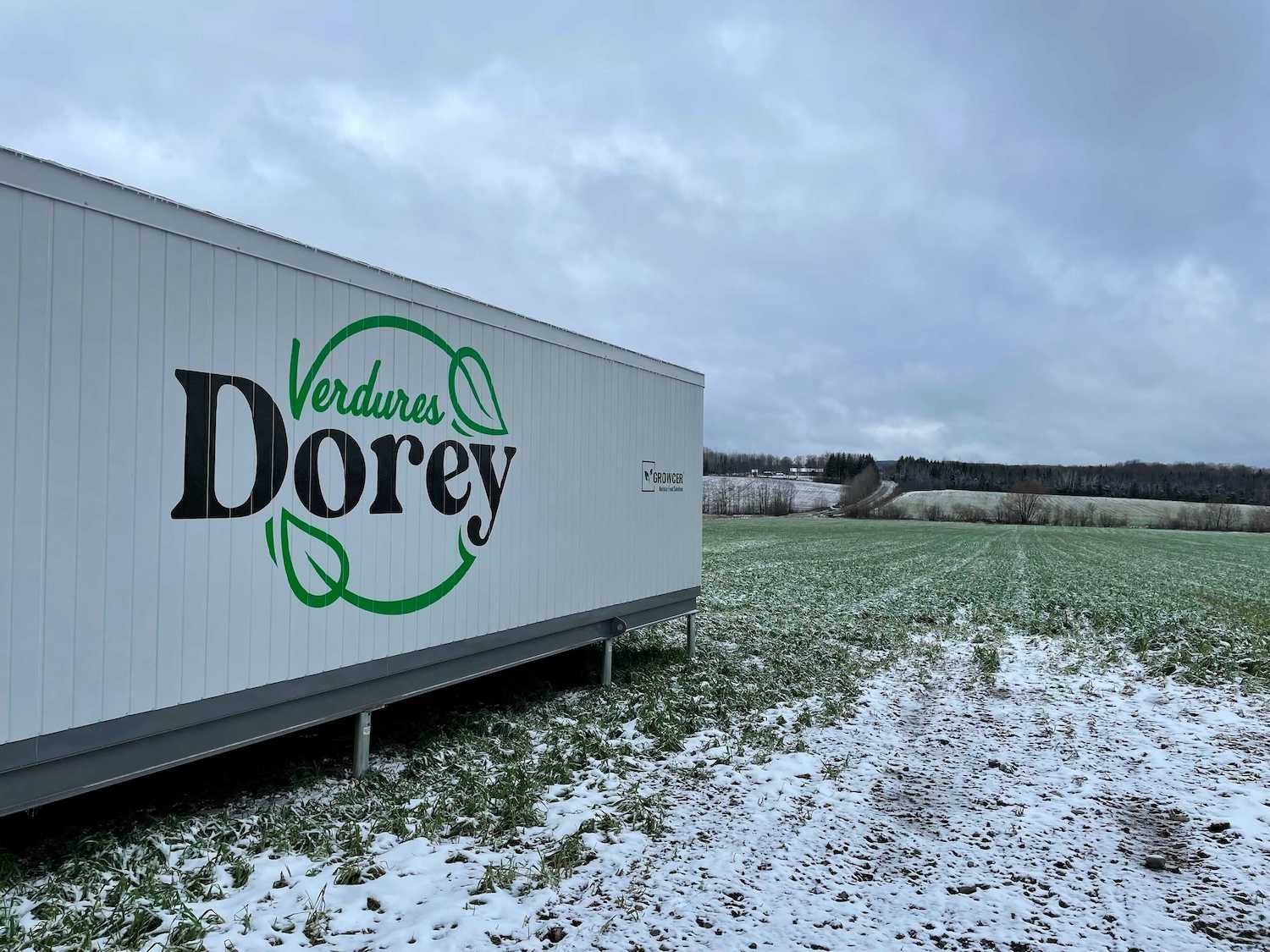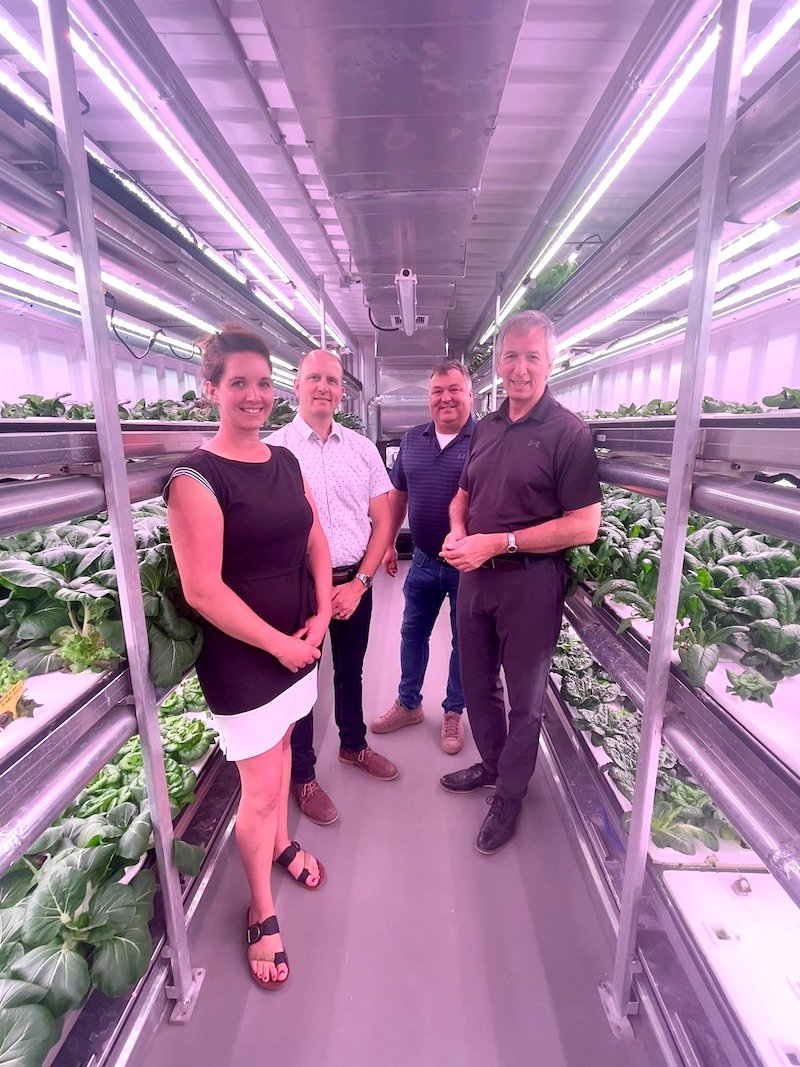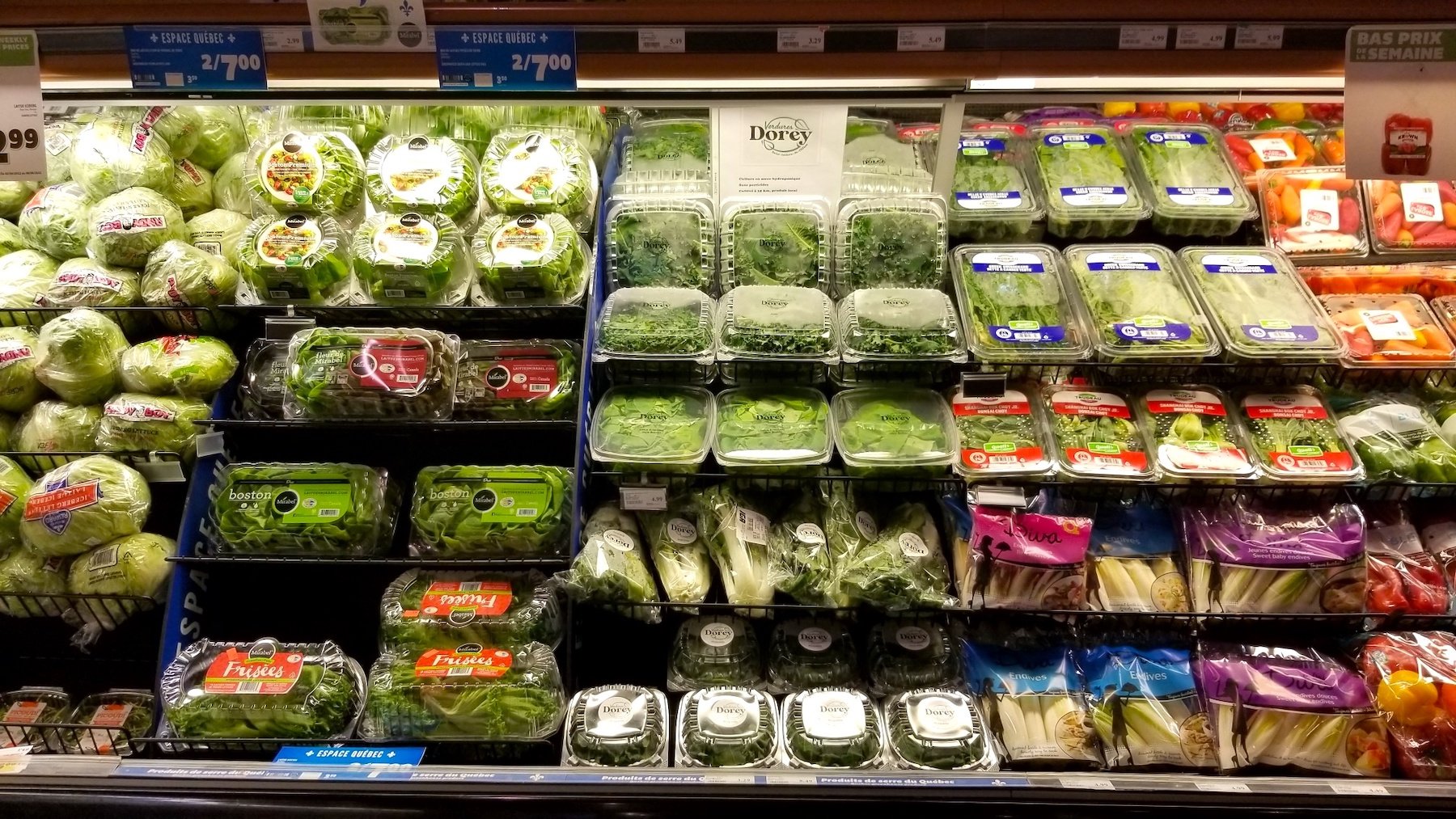Diversifying the dairy farm: Verdures Dorey
Project at a Glance
Installed in November 2021 in Saint-Isidore-de-Clifton, Quebec.
Project goal: Diversify income for the dairy farm with indoor farming.
Distribution model: Produce is sold through local grocery stores and on-site directly to consumers under the “Verdures Dorey” brand.
Impact: Added a new stream of revenue for the farm and a source for fresh produce year-round in the Eastern Townships region, southeast of Sherbrooke, Quebec.
Operator: The farm is operated by the dairy farm owners and, at times, their staff.
“I really like seeing the final product customers will be eating on their plate. It brings us a lot of pride to see that produce.”

Income diversification through hydroponics
In recent years, dairy farming became more riddled with uncertainty because of fluctuating weather conditions and losses from trade agreements.
Audrey Turgeon and Dominic Godin run a small dairy and mixed grain farm in rural Saint-Isidore-de-Clifton, Quebec, and had long been looking for ways to diversify their farm.
During the pandemic, they happened to see a TV story about Growcer — and the idea clicked. “The idea for a container farm really happened when Dominic and I decided to diversify the income of our dairy farm,” Turgeon explains. “We chose [Growcer] to diversify the activities of our existing business.”
The modular hydroponic farm allows their farm to produce fresh greens alongside their regular production of milk.

The modular hydroponic farm allows their farm to produce fresh greens alongside their regular production of milk.
Fresh greens, more revenue year-round

Audrey seeding the first seeds during training - a three day, hands-on walk through of the Growcer farm so you feel comfortable starting on the right foot.

Turgeon and Godin expanded their 40-cow dairy operation with a 40-foot modular farm, and it’s the first project of its kind in southern Quebec.
They call their new venture “Verdures Dorey” and grow spinach, kale, butterhead lettuce, wildfire lettuce, bok choy, and arugula. With their modular farm, they harvest around 400 heads of produce weekly with plans to ramp up in the future once they get more comfortable.
“We are really happy that the farm has finally arrived, because we are ready to take on this new challenge,” Turgeon says. “We can’t wait to plant a bit of everything and try everything because we think variety is important, but I think I have a preference for lettuce and spinach.”
With hydroponics, plants grow indoors through a soil-free farming method using nutrient-rich water. This uses less land and water and no synthetic pest control products while also cutting down growing time. Within five to 12 weeks from seed to harvest, locals gain access to fresh greens year-round. Not only does the produce last longer in the fridge, but it also supports sustainable, hyper local farming.
With Growcer’s help, the process to get up and running was simple for Turgeon and Godin. The modular farm is fully automated adjusting plant growth factors and the environment in real-time. This makes it a “smart farm” that’s easy to maintain alongside their dairy and grain business.
It’s also one of the reasons Growcer can partner with all kinds of organizations looking to generate year-round revenue because the turn-key modular farms are accessible to anyone, regardless of their farming experience.
Quebec's Minister of Agriculture André Lamontagne and Minister of Municipal Affairs François Jacques visiting the Verdures Dorey farm.
A community effort with delicious results
The couple sell what they grow directly to customers under the “Verdures Dorey'' brand and partner with nearby stores such as Le Compthé in Compton and Legufruits in Coaticook.
The produce travels less than 35 kilometres to reach store shelves and even less to reach their produce subscribers. Local customers are happy to choose the more sustainable, tastier option grown locally.
“My favourite part about the work in the farm is the harvests, because it’s the result of the work we put in the farm,” says Godin.
“I really like seeing the final product customers will be eating on their plate,” Turgeon adds. “It brings us a lot of pride to see that produce.”
That sense of pride is evident when customers visit Verdures Dorey. “What’s fun, too, about the farm is its involvement with the community,” Godin says. “We are in a small town, and people can come to the farm directly and buy fresh produce.”
Meanwhile, Turgeon and Godin have been able to diversify the farm, giving them year-round revenue on top of their other income streams.
The excitement of the first few sales enabled Turgeon and Godin to continue building momentum locally. They initially started selling produce at the farm and then went on to collaborate with local businesses. “The first contract we made for a large delivery to a grocery store was a moment we enjoyed a lot,” Turgeon recalls, adding that the first few weeks at the farm were exciting, “seeing the love from people for our produce.”
Turgeon notes that from the beginning, the support from Growcer enabled the dairy farmers to get started on the right foot. “They helped us develop our business model, too, to get access to the financing for the farm,” Turgeon explains. “Now when we have an issue or any questions, they are very easy to contact.”
Beyond achieving their goal to diversify the farm and create year-round revenue, Turgeon and Godin agree that modular farming is simply a fun way to grow food. They plan to eventually expand to a second or third farm. “It’s a peaceful environment working in the farm,” says Turgeon. “Of course, it takes some adaptability at the beginning, but it’s really good fun. Go for it!”
“It’s a peaceful environment working in the farm. Of course it takes some adaptability at the beginning, but it’s really good fun. Go for it!”
Results
Audrey and Dominic grow spinach, kale, butterhead lettuce, wildfire lettuce, bok choy, and arugula. With their modular farm, they harvest around 400 heads of produce weekly with plans to ramp up as they get more comfortable.
The couple sell out of everything they grow. They distribute directly to customers under the “Verdures Dorey'' brand and partner with nearby stores such as Le Compthé in Compton and Legufruits in Coaticook.
Verdures Dorey received attention from local government ministers for their on-farm innovation from Quebec's Minister of Agriculture André Lamontagne and Minister of Municipal Affairs François Jacques.

Verdures Dorey produce travels less than 35km to reach grocery store shelves and the couple has partnerships with up to 8 grocery stores in their local area.
Download webinar: Modular Farming as a Sustainable Business
As the market for quality, locally grown produce soars, modular farming is a turn-key solution to satisfy both market demand while plugging gaps in our local food system.
Modular farming is a reliable option to supply restaurants, retailers, or add a source of nutritious produce for communities that lack access.
But sometimes it can be a hard to wrap your head around how to launch and maintain a sustainable modular farming business.
Can modular farming be an opportunity for you? Download this webinar to understand:
differences between types of indoor farming,
common operating models, and
how to make sense of the dollars and cents.
With modular farming, you can add fresh nutritious produce to your plate, and to everyone else’s too.
